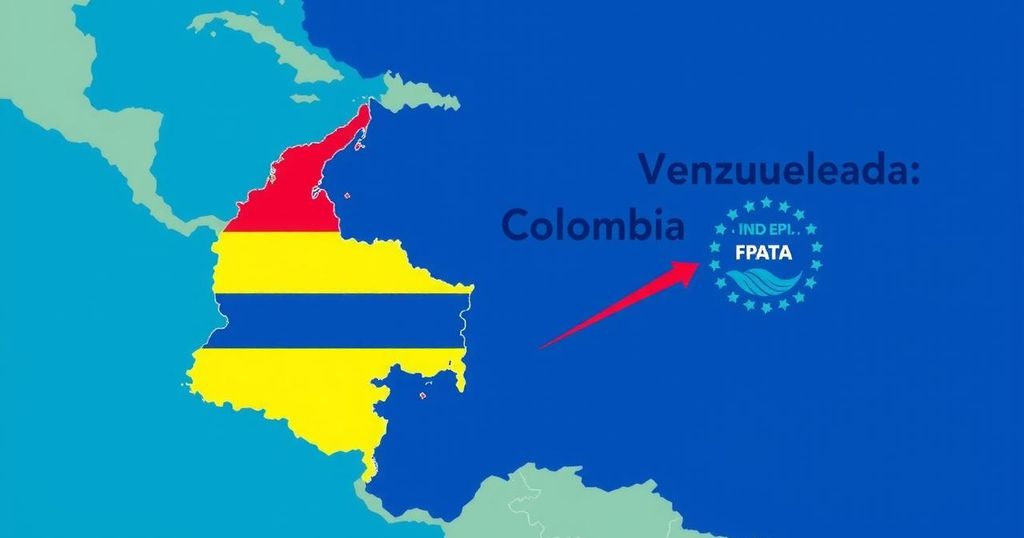The reopening of the Colombia-Venezuela border led to heightened smuggling and extortion activities rather than a restoration of lawful trade. Criminal groups exploit illegal routes, driven by distrust of Venezuelan authorities and economic disparities. The border’s reestablishment has not significantly improved trade volume, showing a reliance on illicit routes and escalating violence in local communities.
As night descends upon Cúcuta, Colombia, the border city steeps in illicit activities as criminal networks exploit the darkness to smuggle goods into Venezuela. Illegal dirt paths, referred to as “trochas,” have become vital routes for smuggling and human trafficking. Although President Nicolás Maduro closed the border on February 2019 following opposition attempts to deliver humanitarian aid, the subsequent wave of smuggling intensified, especially during the COVID-19 pandemic. The official reopening of the border on September 26, 2022, was initially seen as a potential restoration of lawfulness. However, criminal organizations have not diminished; instead, they are augmenting their revenue through extortion, disproportionately affecting local communities. Cargo vehicles still traverse the official crossings over the Simón Bolívar and Atanasio Girardot bridges, primarily used for goods destined for Venezuela, while skirting illegal routes continues unabated as authorities often overlook these activities. Prior to the closure, trade between Colombia and Venezuela was substantial, peaking at $7 billion in 2008. With the border’s reopening, there was optimism for a renewal of trade yet scant progress has been made, with estimates falling significantly short at only $1.2 billion. Distrust towards Venezuelan authorities remains a major impediment, compelling businesses to favor illegal routes where transactions are more assured. Ronal Rodríguez of Universidad del Rosario asserted, “With the trochas, there’s just one payment, and the cargo is secure.” Significant barriers to normal trade include imposed checkpoint fees and the complications arising from economic sanctions against Venezuela. This distrust and the conditions on the ground have allowed local networks to exploit substantial price disparities, smuggling essential goods, like food items, across the border, often neglecting hygiene standards and safety regulations. For instance, a liter of milk bought in Colombia for $0.90 may be resold for nearly double the price in Venezuela, evidencing stark market inequalities and health concerns. Furthermore, armed groups exert control over smuggling routes. The National Liberation Army (ELN) and gangs like Tren de Aragua have adjusted operations in light of the border’s reopening, with ELN sustaining its revenue streams through extortion related to track usage. Meanwhile, Tren de Aragua must now target Cúcuta businesses to sustain income, leading to heightened threats towards local establishments. The competition for economic control has evidently augmented violence within Cúcuta, with a disturbing rise in criminal acts including grenade attacks.
The Colombian-Venezuelan border has seen a complex web of smuggling operations flourish, especially following governmental interventions and the COVID-19 pandemic. This history sets the stage for understanding the profound impact of the border’s reopening. The drastic closure in 2019 following humanitarian aid attempts provided a backdrop for criminal enterprises to thrive, further complicating the socio-economic landscape. As trade routes reopened, the expected normalization of activities failed to materialize, emphasizing the pervasive distrust and entrenched criminal activities. This context is essential to understand the ongoing dynamics of smuggling, community extortion, and the anomalies characterizing trade between the two nations.
In summation, the reopening of the Colombia-Venezuela border has not eradicated smuggling but instead transformed the dynamics of illicit trade and extortion within Cúcuta. Criminal organizations continue to leverage illegal routes, exacerbating local insecurity and economic fragility. The entrenched distrust of Venezuelan authorities combined with significant market disparities drives many to engage in smuggling activities, all while local armed groups strategically exploit vulnerabilities to maintain or increase their control and revenue. Thus, the border’s reopening has rendered the expectations of normalization against a backdrop of persistent criminality and violence.
Original Source: insightcrime.org






